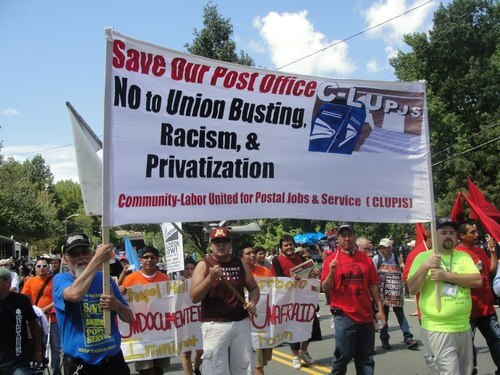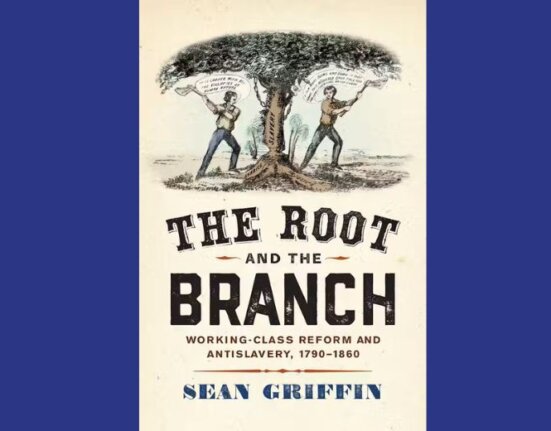It’s Saturday February 9th as I write this. Every postal worker knows by heart their first official day of work as their “anniversary date.” Not for sentimental reasons, but for purposes of seniority, retirement, and all the benefits thereof. It’s an important date.
I retired early from the post office in Durham, North Carolina after 20 years to go to graduate school (30 years is standard retirement at the US Postal Service). But even though it’s been almost 13 years since I last punched off the clock, I still remember my anniversary date: February 9, 1980. Making $8.10 an hour to start: up from $2.95 an hour a decade, the result of over 200,000 postal workers staging an eight-day nationwide wildcat strike beginning March 18, 1970–the largest wildcat in U.S. history, leading to the 1971 transformation into the US Postal Service as a self-supporting independent government agency.
February 9, 1980 began a week of paid, on-the-job training for me in Denver, Colorado. Postal management impressed upon us the imperative of maintaining the “sanctity of the mail.” That same week union representatives urged us to join whatever union went with our craft. The vast majority of postal workers are unionized.
I transferred from clerk to carrier that same year. Everyone I worked with was committed to the people we served as “patrons” not customers. That commitment was something we both shared and clashed with management over. Cutbacks in service often accompanied attacks on our rights as workers to have enough time to perform our duties professionally, as well as to have adequate time off from what could be a physically very demanding job.
Since I left the post office, I have written a book on black postal workers’ history of workplace activism and civic engagement, and the historic role of the post office in black community development. With the manufactured crisis caused by the 2006 Postal Accountability and Enhancement Act demanding the USPS set aside $5.5B a year for retirees’ health benefits for ten years, the USPS began running huge deficits where it would otherwise have run surpluses In 2011 when the crisis became acute I started getting requests for interviews, articles, and blogs like this one. It felt like I was still on the clock!
Indeed, reading Postmaster General Donahoe’s sudden announcement last week of the abolition of Saturday mail delivery beginning in August was like being forced to attend one of the periodic “stand-up talks” on the shop floor where bewildering proclamations like these were often made. Often heated exchanges would follow, similar to the daily dustups over how much bulk mail they expected us to carry in eight hours in addition to first class and periodicals that had to go.

Saturday was a day we all would rather have had off at the post office. Going to your kids’ athletic events, for instance, meant either hoping your rotating days off included that day, or having to use up some annual leave. But everyone understood Saturday delivery was also part of a service tradition that meant job security for us and thousands more like us. Congress first made six-day delivery part of its free city delivery mandate by federal statute March 3, 1863, effective July 1st of that year. Even though multiple daily deliveries were abolished in 1950, Saturday delivery remained embedded in postal policy. Private carriers now with forgotten names came and went as the post office added new services, deleting others. Meanwhile six-day delivery was again mandated by Congress in 1983.
PMG Donahoe’s decision is also legally suspect, since only Congress can decide that matter (that fact that Congress won’t just drives the crisis deeper). The PMG’s proposal to eventually cutback to only thrice-weekly delivery only adds insult to injury. And pronouncements like this seem even more curious following the USPS’s highly touted “same-day delivery” trial run in San Francisco announced just two months ago.
To get a grasp of on the current curious three-way battle between postal unions, postal management, and the House Republican majority, I recommend excellent websites like www.savethepostoffice.com , www.nalc.org , and www.apwu.org. These organizations continue to challenge the already discredited narrative that the USPS will save $2 billion a year (this does not factor in revenue and service lost, not to mention the fact that many carriers will still be out on the streets delivering parcels on Saturdays). Finally, we can’t forget the escalating loss of mail processing centers, local post offices, and thousands of jobs, particularly those held by African Americans.
From the early sixties, one-fifth of the postal workforce has been black–higher in most major urban areas, and with cities like Detroit, Chicago, Los Angeles, and Washington, D.C. having had black majorities since then. Up until recently, the USPS was the largest employer of African Americans. (Today it is number two behind Wal-Mart, although we should probably insert an asterisk here, since the average Wal-Mart worker leaves after a year, while the USPS workforce has an astoundingly low “quit rate” of 1%.) We should remember that black postal workers, who were legally allowed to work for the post office in 1865, helped to create today’s diverse postal workforce that is under attack with continued austerity measures.
Yet that workforce of just under 550,000 workers (about 200,000 fewer than a decade ago) continues to shrink at the expense of service. Thousands of clerk jobs in the last decade were lost to automation that could have been converted to other functions within the post office. Added to this are the thousands more jobs lost to self-defeating plant and post office closings with little savings. Now thousands of carrier jobs will be lost to not only Saturday delivery abolition, but also the replacement of door-to-door delivery by cluster box and curbside delivery.
Service and postal worker welfare are both threatened at a time of high worker productivity, high consumer satisfaction, and annual revenue gains (then lost through the prefunding requirement shakedown). Even the claimed public support for Saturday delivery abolition is a compromised statistic because surveys invariably ask subjects if they favor this move to keep the USPS solvent. (Why not also ask: “Would you be willing to give up one of your child’s school days every week if it meant keeping school buses on the road?”)
Some academics have already lent their voices to the growing pushback led by postal unions and concerned consumers against privatization. We as labor historians have to help present this latest and most visible attack on public sector workers and enterprises in relationship to the evidence. But an organized groundswell is really needed now to stop what snow, rain, heat, and gloom of night could never do before.








2 Comments
Comments are closed.